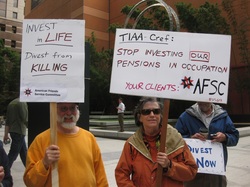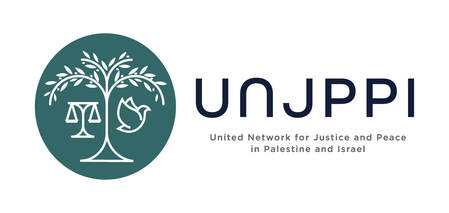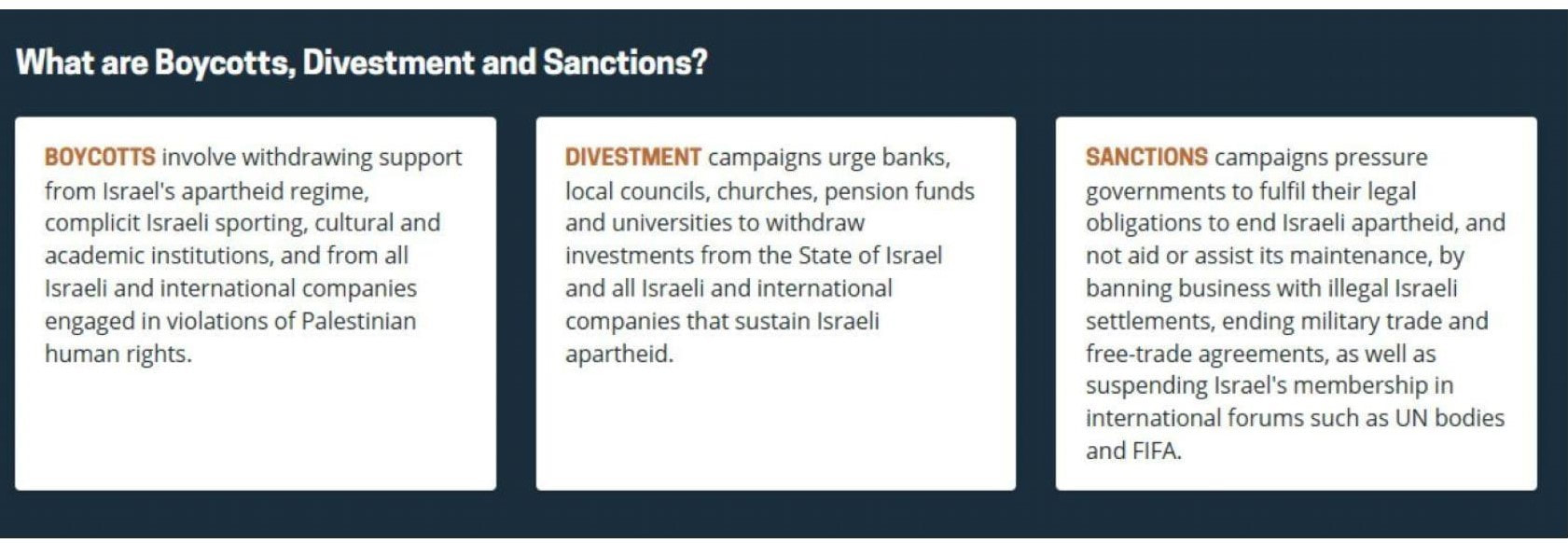Boycott, Divestment and Sanctions Explained
|
|

Published: February 28, 2013
Photo: AFSC AFSC and BDSAFSC’s Israel-Palestine work is guided by its “Principles for a Just and Lasting Peace in Palestine and Israel.” These principles support the implementation of international human rights and humanitarian law and call for an end to Israel’s occupation of the Palestinian territories, support self-determination for both Israelis and Palestinians, implementation of refugees’ right of return, and equality for Palestinians and Israelis. In the context of Israel and Palestine AFSC supports the the use of boycott and divestment campaigns targeting only companies that support the occupation, settlements, militarism, or any other violations of international humanitarian or human rights law. Our position does not call for a full boycott of Israel nor of companies because they are either Israeli or doing business in Israel. Our actions also never focus on individuals. Our support for the use of boycotts and divestments is contextualized by Quakers and AFSC's long support for boycotts, divestment, and sanctions as economic tactics that appeal to human conscience and change behavior. In the 1800s, Quakers helped lead the “Free Produce Movement,” a boycott of goods produced using slave labor. In recent times, AFSC has participated in boycott and divestment campaigns connected to the civil rights, anti-apartheid, farm worker, and prison rights struggles. Since 1948 AFSC has worked with both Palestinians and Israelis to achieving a just and lasting peace and we remain committed to supporting nonviolent activism designed to achieve this end. Taking into account AFSC principles and history, AFSC supports all nonviolent efforts to realize peace and justice in Israel and Palestine including the strategic use of boycott, divestment, and sanctions tactics. What is BDS? BDS stands for Boycott, Divestment and Sanctions. In the Israel-Palestine context, BDS refers to a call issued by over 170 Palestinian organizations in 2005 asking that the international community implement boycott and divestment initiatives to bring change in Israel and Palestine. The initial Palestinian call was signed by a broad coalition that included unions, academics, political parties, cultural groups, and civil society organizations. BDS is a form of economic activism that is premised on the idea that violations of Palestinians’ rights result not only from Israeli government policies and actions, but also from corporate and institutional policies and actions that support and sustain Israel’s occupation and violations of international human rights and humanitarian law. Boycott and divestment actions therefore target institutions and companies (Israeli and international) that profit from or are complicit in the violation of Palestinian rights with the goal of changing corporate/institutional and Israeli actions. In all cases, BDS actions target institutions—not individuals—for their complicity in Israel’s occupation and/or human rights abuses. What does BDS hope to accomplish? The Palestinian BDS call requests that international civil society groups and individuals target Israel using boycott, divestment, and sanctions tactics until Israel meets its obligation under international law to recognize the Palestinian people’s right to self-determination and:
The “BDS movement” is made up of an informal coalition of international, national, and local groups that include faith-based organizations, peace groups, solidarity and student activists, and other coalitions of concerned individuals. Supporters of the Palestinian BDS Call hold in common a commitment to using nonviolent boycott, divestment, and sanctions tactics until Israel ends its occupation and complies with the rights outlined above. What does BDS look like? Boycott, divestment, and sanctions are nonviolent tactics used by activists to help realize specific changes. They are not ends unto themselves. For this reason, BDS is not a one-size that fits all movement but rather is a movement that recognizes the importance of carrying out customized actions targeted to local contexts and political realities. In this sense there is no leadership within the BDS movement that dictates what actions activists should take to help realize the three core BDS rights. However, the Boycott National Committee was set up in 2007 by the Palestinian signatories to the 2005 BDS Call and plays a core role in coordinating and building awareness about BDS actions and successes around the world. BDS campaigns take many different forms. Groups around the world have organized street protests, board room lobbying, shareholder actions, lawsuits, strikes, teach-ins, and other actions to call attention to corporate and institutional complicity in occupation. Among others, targets have included arms manufacturers, agricultural exporters, cosmetic manufacturers, cultural groups, investment firms and academic institutions. What links these disparate campaigns is their common goal of ending corporate and institutional complicity in Israel’s occupation and violations of international human rights and humanitarian law. Below are examples of several broadly successful BDS campaigns: We Divest The “We Divest” Campaign asks investment giant TIAA-CREF to divest from corporations that profit from the military occupation. TIAA-CREF is one of the largest retirement account providers in the U.S. and has the largest social choice investment fund in the U.S. Companies targeted through this campaign include Veolia, Caterpillar Inc., Elbit Systems, Motorola Solutions, HP, and Northup Grumman. During 2012 the campaign marked a significant victory when TIAA-CREF dropped Caterpillar Inc. from its social choice accounts in part due to Caterpillar’s provision of military equipment to the Israeli military. Stolen Beauty “Stolen Beauty” is a boycott campaign initiated by Code Pink in 2009 that targets stores that sell products produced by AHAVA Dead Sea Laboratories. AHAVA produces a popular line of beauty and skin care products in an illegal Israeli settlement located in the West Bank using natural resources stolen from West Bank portions of the Dead Sea in violation of international law. Campaign actions have targeted retailers selling and celebrities endorsing AHAVA products. As a result of the campaign, several stores and celebrity endorsers have ended their associations with AHAVA. Dump Veolia Veolia profits by operating segregated bus lines connecting settlements to Israel, operating a landfill built on confiscated Palestinian land in the West Bank for the benefit of settlements, and constructing and operating a light rail system built in occupied East Jerusalem and servicing Israeli settlements. Since 2005 groups in Europe and the U.S. have organized a variety of highly successful boycott campaigns targeting Veolia. As a result, the company has lost over $13 billion in contracts and many investors, with several communities worldwide declaring themselves "Veolia Free." For more information: We Divest: http://wedivest.org/ SodaStream Boycott: http://sodastreamboycott.org/ Who Profits: http://www.whoprofits.org/ Global Exchange: Economic Activism for Palestine Project: http://www.globalexchange.org/programs/economicactivism Quakers with a Concern for Palestine-Israel: http://www.quakerpi.org/default.shtml The U.S. Campaign to End the Israeli Occupation: http://www.endtheoccupation.org/ Kairos Palestine: http://www.kairospalestine.ps/ The Boycott National Committee: http://www.endtheoccupation.org/ The Palestinian Academic and Cultural Boycott Initiative: http://www.pacbi.org |
|


